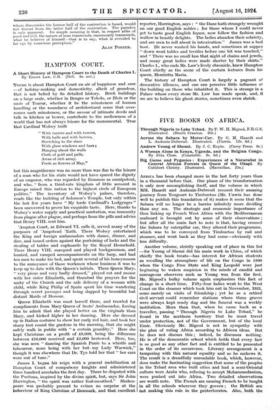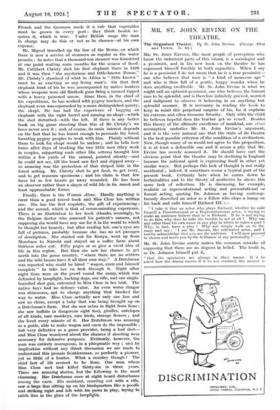FIVE BOOKS ON AFRICA.
Andrew Young of Shensi. By J. C. Keyte. (Carey Press. 6s. ) Big Game and Pygmies : Experiences of a Naturalist in Central African Forests in Quest of the Okapi. By Cuthbert Christy. Illustrated. (Macmillan. 21s.)
AFRICA has been changed more in the last forty years than in a thousand before that. One phase of the transformation is only now accomplishing itself, and the volume in which MM. Haardt and Audouin-Dubreuil recount their amazing journey. from Tougourt to Timbuctoo (Mr. Unwin has done well to publish this translation of it) makes it seem that the Sahara will no longer be a barrier infinitely more dividing than any sea. The strategic and economic importance of thus linking up French West Africa with the Mediterranean seaboard is brought out by some of their- observations ; but after all the main fact to note is that, having crossed the Sahara by caterpillar car, they altered their programme, which was to be convoyed from Timbuctoo by rail and steamer, and went back as they had come—obviously with less difficulty.
Another volume, strictly speaking out of place in this list —for Young of Shensi did his main work in China, of which chiefly the book treats—has interest for African students as recalling the atmosphere of life on the Congo in 1890 when the Congo Free State and King Leopold were just beginning to waken suspicion in the minds of candid and courageous observers such as Young was from the first.
Mr. Migeod's bulky volume again emphasizes this fact of change in a short time. Fifty-four ladies went to the West Coast on the steamer which took him out in November, 1921, some merely on visits of friendship ; yet he as a retired civil servant could remember stations where three graves were always kept ready dug and the funeral was a weekly institution. More than that, when he came back as a traveller, passing "Through Nigeria to Lake Tchad," he
found in the northern territory that he must travel under protection, not of the Government, but of the local Emir Obviously Mr. Migeod is not in sympathy with
the plan of ruling Africa according to African ideas. But he does not discuss this ; indeed, he discusses nothing. He is of the democratic school which holds that every fact is as good as any other fact and is entitled to be presented in the order of its occurrence. Literary arrangement is a tampering with this natural equality and so he eschews it.
The result is a dreadfully unreadable book, which, however, does make the fascinating suggestion that some of the peoples in the Tchad area who built cities and had a semi-Oriental culture were Arabs who, refusing to accept Mohammedanism,
were pushed out into Africa. Two detailed observations are worth note. The French are causing French to be taught in all the schools wherever they govern ; the British are not making this rule in the protectorates. Also, both the
French and the Germans made it a rule that vegetables must be grown in every post : they think health re- quires it, which is true. Under British usage the man in charge may do this or not as he chooses—at his own expense.
Mr. Migeod travelled up the line of the Benue, on which there is now a service of steamers as regular as the water permits : he notes that a thousand-ton steamer was foundered at one point waiting some months for the season of flood. Mr. Cuthbert Christy shot his first elephant there in 1899 and it was then "the mysterious and little-known Benue." Mr. Christy's standard of what in Africa is "little known" must be as exacting as any living man's. On that first elephant hunt of his he was accompanied by native hunters whose weapons were old flintlock guns firing a ramrod tipped with a heavy poisoned arrow. Since then, in the chief of his expeditions, he has worked with pygmy trackers, and the elephant even wassuperseded by a more distinguished quarry, the okapi. He has had the experience of bagging an elephant with the right barrel and missing an okapi—which the shot disturbed—with the left. If there is any better hook on big game shooting than this of Mr. Christy's we have never seen it ; and, of course, its main interest depends on the fact that he has learnt enough to persuade the forest haunting pygmy peoples to work with him. Plainly without them to look for okapi would be useless ; and he tells how twice after days of tracking the two little men (they work in couples, supporting each other like setters) brought him within a few yards of the animal, pointed silently—and he could not see, till the beast saw first and slipped away— so amazing was the protection of that striped hide in the forest setting. Mr. Christy shot to get food, to get ivory, and to get museum specimens ; and his claim is that few have let so few beasts go away wounded. He has been an observer rather than a slayer of wild life in its rarest and least approachable forms.
Finally, there is the Woman Alone. Hardly anything is rarer than a good travel book and Miss Close has written one. She has the first requisite, the gift of experiencing : and the second, which is that of communicating experience. There is no illustration to her book (thanks, seemingly, to the Belgian doctor who annexed his patient's camera, not supposing she would have any use for it in the world to which he thought her bound); but after reading her, one's eyes are full of pictures, probably because she has no set passages of description. She started out for Kenya, went up from Mombasa to Nairobi and stayed on a coffee farm about thirteen miles out. Fifty pages or so give a vivid idea of life in this region. But then she saw her chance to get north into the game country, "where there are no settlers and the wild beasts have it all their own way." A Dutchman was reported who could be hired "wagon, oxen and himself complete" to take her on trek through it. Night after night lions were on the prowl round the camp, which was defended by lamplight, barking dogs, one rifle, and one single- barrelled shot gun, entrusted to Miss Close in her tent. The native boys had no defence value. An even worse danger was rhinoceros, apt to charge anything that blocked the way to water. Miss Close actually saw only one lion and saw no rhino, except a baby that was being brought up on a Dutchman's farm. But she saw zebra in flight from lions : she saw buffalo (a dangerous sight too), giraffes, antelopes of all kinds, rare monkeys, rare birds, strange flowers ; and she lived every minute of it. Her Dutchman was amazing as a guide, able to make wagon and oxen do the impossible but very defective as a game provider, being a bad shot—
and Miss Close wondered about the chances if shooting were necessary for defensive purposes. Evidently, however, the
man was entirely courageous, in a phlegmatic way ; and by implication without any direct discussion we are made to understand this prosaic frontiersman, so perfectly a pioneer,
yet so little of a hunter. What a country though I The chief fact of life seemed to be lions. One man whom Miss Close met had killed thirty-six in three years.
There are amazing stories, but the following is the most charming. Her Dutchman once at night heard disturbance among the oxen. His assistant, crawling out with a rifle,
saw a large lion sitting up on his hindquarters like a poodle and striking right and left with his paws in play, frying to catch flies in the glare of the lamplight.



































 Previous page
Previous page